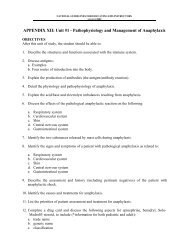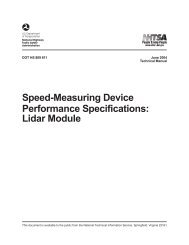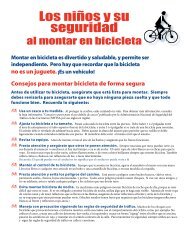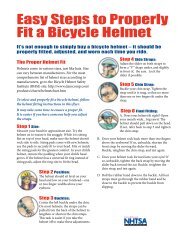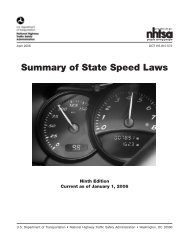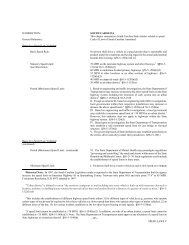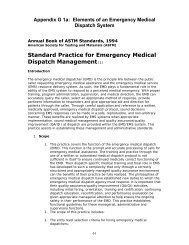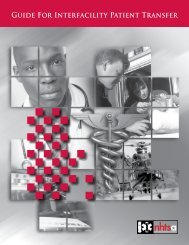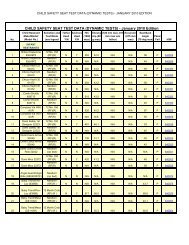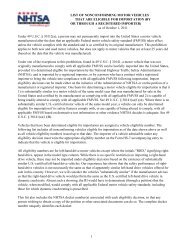The Criminal Justice System: A Guide for Law Enforcement ... - NHTSA
The Criminal Justice System: A Guide for Law Enforcement ... - NHTSA
The Criminal Justice System: A Guide for Law Enforcement ... - NHTSA
You also want an ePaper? Increase the reach of your titles
YUMPU automatically turns print PDFs into web optimized ePapers that Google loves.
without any bail being set. This is common <strong>for</strong> lower level offenses committed by<br />
persons who live and/or work in the community.<br />
Bill of Rights <strong>The</strong> first ten amendments to the United States Constitution. <strong>The</strong><br />
Bill of Rights includes numerous rights specifically intended to benefit defendants in<br />
criminal prosecutions. Because the Constitution is the supreme law of the United States,<br />
no Federal, State, or local law can diminish those rights.<br />
<strong>The</strong> Bill of Rights sets <strong>for</strong>th rights, but is silent concerning remedies <strong>for</strong> the<br />
violations of those rights. <strong>The</strong> United States Supreme Court has filled the gap by<br />
fashioning remedies through case law, including the remedy known as the exclusionary<br />
rule (discussed below).<br />
Booking <strong>The</strong> process of officially recording an arrest. It typically includes (1)<br />
photographing the defendant (i.e., taking a “mug shot”); (2) fingerprinting the defendant;<br />
and (3) obtaining pedigree in<strong>for</strong>mation (name, address, date of birth, etc.) from the<br />
defendant. Many lower level offenses (e.g., speeding tickets) do not require booking, and<br />
in those cases the defendant is simply issued a ticket to appear in court on a future date.<br />
In some States, if an arrest ultimately results in a dismissal of the charges, or if<br />
the conviction is <strong>for</strong> an offense below the level of a crime, or if the defendant is under<br />
a certain age as determined by individual State law, the arrest records generated<br />
through the booking will be sealed, so the arrest will not result in a criminal record.<br />
Count One Charge within an accusatory instrument. A single criminal incident<br />
commonly gives rise to multiple charges. For example, a defendant breaks into a home<br />
and steals the flat-panel TV, several gold bracelets, and three diamond rings. During<br />
the course of gathering up these items, he is confronted by the homeowner and<br />
punches her in the face. In addition to the burglary charge, additional charges might<br />
include damage to property (breaking the window to gain entry), theft of property, and<br />
assault/battery <strong>for</strong> hitting the homeowner.<br />
Daubert Hearing A pretrial hearing used in some jurisdictions to determine<br />
whether or not “scientific evidence” will be allowed at trial. Under this test, judges<br />
evaluate whether the evidence is both “relevant” and “reliable” in determining if it will be<br />
admissible at trial. This standard differs from Frye in that it does not mandate a showing<br />
that the evidence has been “generally accepted in the scientific community.”<br />
Deposition Witness testimony taken under oath in response to written<br />
interrogatories (a list of questions prepared in advance) or oral questions during the<br />
investigation or pretrial phase of a legal action.<br />
Discovery A pretrial stage where the parties exchange in<strong>for</strong>mation about the<br />
evidence and arguments they will offer at trial. In many States, the burden of supplying<br />
discovery in<strong>for</strong>mation rests almost entirely upon the prosecution. This is because the<br />
presumption of innocence and the privilege against self-incrimination generally permit a<br />
defendant to remain silent throughout the prosecution.<br />
31



